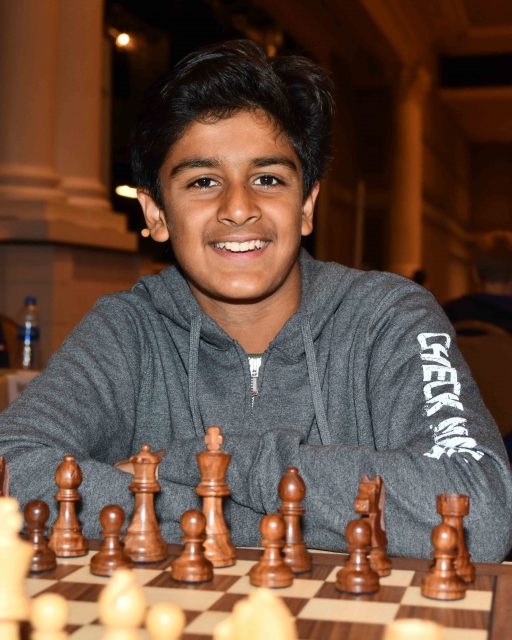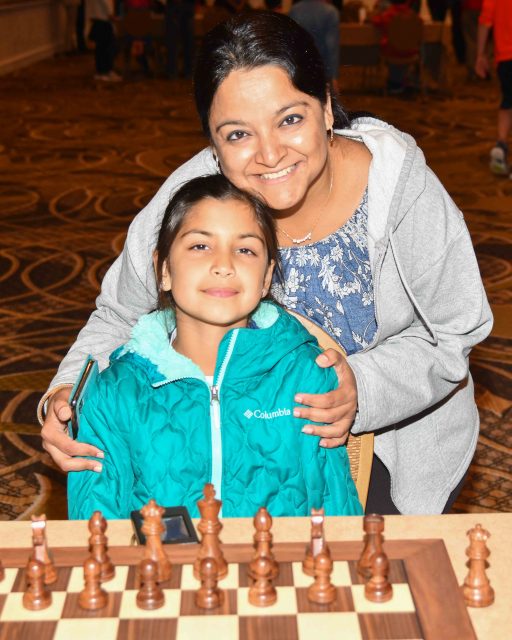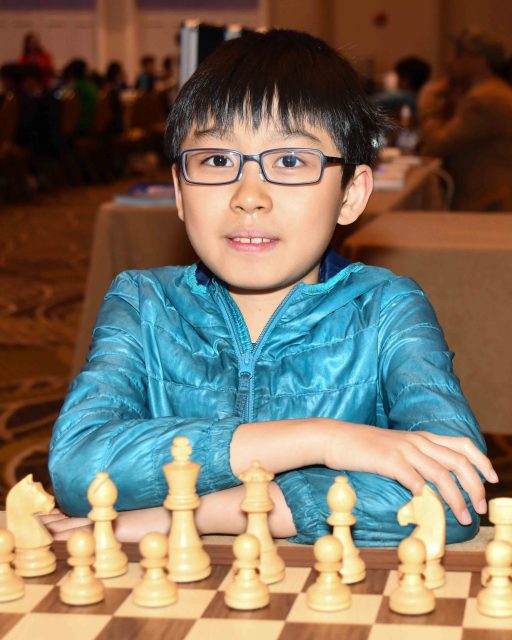The 2019 National Elementary Championship, held May 10-12 at the Gaylord Opryland in Nashville, has been the largest rated event in American chess for 24 consecutive years. (The last time anything was larger was in 1995, when the National Elementary drew “only” 1182 competitors and the World Open had 1435 players.) Some may contest this fact, as there have been six SuperNationals during this 24 year stretch, but because the Elementary is the largest division at SuperNationals, it still holds pride of place as the year’s “biggest tournament.”
This year’s event had 2303 players spread across 14 sections, and there were 7757 rated games played. It takes a lot of people to run such a large event. There were 66 tournament directors (TDs) on site as well as 20 non-directing staff members, all working to handling a myriad of logistical details. Of the current list of 97 National TDs – the top achievement a TD can earn – in the country, there were an incredible 21 NTDs in Nashville. An event like this is a marathon, not a sprint, and all of the TDs certainly have their work cut out for them. My pedometer tells me I walked 26.9 miles during this event and I’m sure I didn’t have the most steps!
The country’s newest and youngest NTD was part of the team. The National Elementary was 17 year old Sam Shoykhet’s first event as an NTD. He learned at the event that he recently passed the exam and is now the record holder for the youngest NTD! Here's Sam at this year's U.S. Championship, while he was waiting to hear the results of his testing.
https://twitter.com/USChess/status/1109927784959406083
I also noticed at least four other NTDs who were not on staff, but were on-site in some other capacity such as coaching.
Speaking of coaches: you can look around at any National Scholastic and see a who’s who of famous coaches, including several of whom have had book and movies made about them. This year was no exception, but one person merits particular attention.
https://twitter.com/USChess/status/1127659094033207296
David MacEnulty has been coaching chess for over 25 years in New York City schools, and he was the first to teach chess as part of the academic curriculum. MacEnulty currently teaches chess at The Dalton School, but he will retire this year on June 1st after a distinguished career. MacEnulty was recognized as 2007 Chess Educator of the Year by the University of Texas at Dallas, and he earned a “Lives That Make a Difference award” from A&E Television among a large list of significant recognitions.
Even though MacEnulty has a host of individual honors, I’m sure he is most proud of his team’s accomplishments rather than his own. Over the years his schools have won numerous championships. His current Dalton teams did not win the National Championship this year, but they finished near the top of every Championship section.
Dalton finished in 4th place in the K-6 Championship. In the K-5 Championship, they finished in second place by a mere half-point, while they tied for second (third on tiebreak) in the K-3! For those who want to see more about this great coach, I recommend viewing the movie “Knights of the South Bronx,” which was inspired by his story and stars Ted Danson.
As you might imagine, with such a large number of players, there are a lot of players to be recognized for their excellent play. By my quick count, this tournament awarded 1238 trophies. While I cannot recognize all of them in this article, you can check out www.uschess.org/results/2019/elem to see all the prize winners, results, pairings, standings, and rating reports.
This year two of the three Championships were won by siblings. Vyom Vidyarthi won the K6 Championship (on tiebreaks) while his sister Omya Vidyarthi won clear first in the K3 Championship section.
 Vyom Vidyarthi (photo Betsy Zacate)
Vyom Vidyarthi scored 6-1 in the K-6 Championship and had the highest tiebreaks of any of the six co-champions. Seeded fourth at the outset, Vyom won his first four games andworked his way up to board one by round four. Vyom surrendered a draw in round 5 to Harry Le, but then won a nice attacking game in round six to retake the lead going into the final round.
Vyom’s round six victory was over Daniel Mero from New York’s Columbia Grammar. Mero is only in 6th grade, but he has been organizing Charity Chess Challenges for the last three years. Over that time, he has raised over one hundred thousand dollars to benefit cancer research! Here is the game from round six:
Vyom Vidyarthi (photo Betsy Zacate)
Vyom Vidyarthi scored 6-1 in the K-6 Championship and had the highest tiebreaks of any of the six co-champions. Seeded fourth at the outset, Vyom won his first four games andworked his way up to board one by round four. Vyom surrendered a draw in round 5 to Harry Le, but then won a nice attacking game in round six to retake the lead going into the final round.
Vyom’s round six victory was over Daniel Mero from New York’s Columbia Grammar. Mero is only in 6th grade, but he has been organizing Charity Chess Challenges for the last three years. Over that time, he has raised over one hundred thousand dollars to benefit cancer research! Here is the game from round six:
 Omya Vidarthi and mom (photo Betsy Zacate)
Meanwhile, Vyom’s sister Omya Vidyarthi also started as the 4th seed in the K-3 Championship. Like her brother, Omya also started off 4-0. She too surrendered a draw in round five before winning in round six to take the lead going into the last round. But Omya won in round seven, finishing with 6.5 points to take clear first and emerge as the K-3 National Champion. Here is her last round victory over Anjaneya Rao.
Omya Vidarthi and mom (photo Betsy Zacate)
Meanwhile, Vyom’s sister Omya Vidyarthi also started as the 4th seed in the K-3 Championship. Like her brother, Omya also started off 4-0. She too surrendered a draw in round five before winning in round six to take the lead going into the last round. But Omya won in round seven, finishing with 6.5 points to take clear first and emerge as the K-3 National Champion. Here is her last round victory over Anjaneya Rao.
 Cooper Ho (photo Betsy Zacate)
This year’s K-5 Championship also had a clear champion, but not one named Vidyarthi! Cooper Ho won his first six games before drawing in the last round to finish at 6.5 points as the K-5 Champion. The crosstable shows that Cooper dominated the tournament, but the games tell a more interesting story.
Cooper played very tactically and in rounds 5 and 6 sac'd pieces a bit speculatively. Objectively, the sacrifices shouldn’t have worked, but in complicated positions, his opponents made mistakes and Cooper won both games. If nothing else, he certainly played fearlessly! Here are diagrams from those games:
Cooper Ho (photo Betsy Zacate)
This year’s K-5 Championship also had a clear champion, but not one named Vidyarthi! Cooper Ho won his first six games before drawing in the last round to finish at 6.5 points as the K-5 Champion. The crosstable shows that Cooper dominated the tournament, but the games tell a more interesting story.
Cooper played very tactically and in rounds 5 and 6 sac'd pieces a bit speculatively. Objectively, the sacrifices shouldn’t have worked, but in complicated positions, his opponents made mistakes and Cooper won both games. If nothing else, he certainly played fearlessly! Here are diagrams from those games:
 Vyom Vidyarthi (photo Betsy Zacate)
Vyom Vidyarthi (photo Betsy Zacate)[pgn] [Event "2019 National Elementary Championship"] [Site "?"] [Date "2019.05.12"] [Round "6.3"] [White "Mero, Daniel"] [Black "Vidyarthi, Yyom"] [Result "0-1"] [ECO "C68"] [WhiteElo "1839"] [BlackElo "2169"] [PlyCount "70"] [EventDate "2019.??.??"] 1. e4 e5 2. Nf3 Nc6 3. Bb5 a6 4. Bxc6 dxc6 5. O-O Bg4 6. h3 Bh5 7. d3 Bd6 8. Be3 Nf6 9. Nbd2 O-O 10. Re1 c5 11. Nc4 b5 12. Nxd6 cxd6 13. g4 Nxg4 14. hxg4 Bxg4 15. Kh2 f5 16. Rg1 Qe8 17. Rxg4 fxg4 18. Ng1 Qh5+ 19. Kg2 Rf6 20. a4 Raf8 21. axb5 axb5 22. c3 Qh4 23. Qd2 Rg6 24. Qe1 h5 25. Ra6 Kh7 26. Rb6 Rf3 27. Qe2 Rf8 28. Qe1 c4 29. Rxb5 cxd3 30. Rb4 Rf3 31. Qd1 Qf6 32. Rc4 h4 33. Qd2 h3+ 34. Kh1 g3 35. Nxh3 g2+ 0-1 [/pgn]Vyom got an edge against Abinav Mundayat in the final round, but could not quite bring home the fill point. This allowed four other players to catch up and join Vidyarthi and Mundayat as co-champions. The six co-champions are in tiebreak order: Vyom Vidyarthi, Abinav Mundayat, Aghilan Nachiappan, Adi Murgescu, Evan Park and James Oh.
 Omya Vidarthi and mom (photo Betsy Zacate)
Omya Vidarthi and mom (photo Betsy Zacate)[pgn] [Event "2019 National Elementary Championship"] [Site "?"] [Date "2019.05.12"] [Round "7.11"] [White "Rao, Anjaneya"] [Black "Vidyarthi, Omya"] [Result "0-1"] [ECO "C54"] [WhiteElo "1831"] [BlackElo "1813"] [PlyCount "136"] [EventDate "2019.??.??"] 1. e4 e5 2. Nf3 Nc6 3. Bc4 Bc5 4. O-O Nf6 5. d3 h6 6. c3 d6 7. b4 Bb6 8. a4 a6 9. a5 Ba7 10. Be3 Bxe3 11. fxe3 O-O 12. Nbd2 Kh7 13. d4 Ng4 14. Qe2 Bd7 15. h3 Nf6 16. Rf2 exd4 17. exd4 Qe7 18. Qd3 Kh8 19. Qc2 Nh5 20. Re1 Nf4 21. Kh2 Rae8 22. e5 g5 23. Bd3 d5 24. Bf5 Be6 25. Bxe6 Qxe6 26. Rff1 Rg8 27. Ng1 Ne7 28. g3 Nh5 29. g4 Nf4 30. Ngf3 Rg7 31. Rh1 h5 32. Kg3 f5 33. exf6 Qxf6 34. Ne5 Qd6 35. Ndf3 Rf8 36. Qd2 Nc6 37. Qe3 Kg8 38. Rhf1 Ne7 39. Qd2 Qh6 40. Rh1 c6 41. Qe3 Nc8 42. Ref1 Nd6 43. Nd2 Re7 44. Qe1 Rfe8 45. Rh2 h4+ 46. Kf2 Rxe5 47. dxe5 Nd3+ 48. Kg1 Nxe1 49. Rxe1 Nb5 50. Rf2 Nxc3 51. Kf1 Qg7 52. Rf6 Rf8 53. Rxf8+ Qxf8+ 54. Kg2 Qxb4 55. e6 Ne4 56. Nxe4 Qxe1 57. Nf6+ Kf8 58. Nh7+ Ke7 59. Nxg5 Qd2+ 60. Kf3 Qxg5 61. Ke2 Kxe6 62. Kd3 Ke5 63. Kc3 Qe3+ 64. Kc2 Kd4 65. g5 Qc3+ 66. Kb1 Qd2 67. g6 Kc3 68. g7 Qb2# 0-1 [/pgn]This was not the first time that siblings have won scholastic championships, but it appears that this is the first time it was a brother-sister combination. Twice two brothers have won national championships in the same year. In 1997, Asuka Nakamura was co-champion in the K-6 section of the first SuperNationals while his brother Hikaru Nakamura went 7-0 to win the K-3 Championship. The next time this occurred was in 2006 when Ryan Moon was Co-Champion in the K-5 section and his brother Benjamin Moon was the K-3 Co-Champion.
 Cooper Ho (photo Betsy Zacate)
Cooper Ho (photo Betsy Zacate)[pgn] [Event "2019 National Elementary Championship"] [Site "?"] [Date "2019.05.11"] [Round "5.8"] [White "Lang, Jayden"] [Black "Ho, Cooper"] [Result "0-1"] [ECO "D10"] [WhiteElo "1866"] [BlackElo "1835"] [SetUp "1"] [FEN "3r2k1/p4ppp/B7/5b2/1b6/1N1pB3/1P3P1P/2KR4 w - - 0 32"] [PlyCount "38"] [EventDate "2019.??.??"] 32. Bc5 d2+ 33. Nxd2 Bxc5 34. f3 Be3 35. b3 Rd7 36. Bc4 a5 37. Bb5 Rd8 38. Bc4 Bg6 39. Bb5 a4 40. Bc4 a3 41. b4 Rc8 42. Re1 Rxc4+ 43. Kd1 Bc2+ 44. Kc1 Rc3 45. Rxe3 Rxe3 46. Kxc2 a2 47. Kb2 Ra3 48. Nb3 Rxb3+ 49. Kxa2 Rxb4 50. Ka3 Rf4 0-1 [/pgn]In this position, White has to be a bit careful, but he is winning. White needs to play 32. Nd4 and the d-pawn will fall and White’s extra material will be decisive. Instead, White played 32. Bc5? And Ho took advantage with 32. … d2+ and now it is Black who has the extra material and will go on to win the game. In round six, Ho again had good fortune.
[pgn] [Event "2019 National Elementary Championship"] [Site "?"] [Date "2019.05.12"] [Round "6.7"] [White "Ho, Cooper"] [Black "Yang, Jack Natha"] [Result "1-0"] [ECO "B48"] [BlackElo "1908"] [SetUp "1"] [FEN "4nk2/8/p1q3p1/1p2Rb2/1Q2pP2/P7/1PP5/2K5 b - - 0 35"] [PlyCount "2"] [EventDate "2019.??.??"] 35... Qd6 36. Rxe8+ 1-0 [/pgn]Ho sacrificed two pieces for a rook and pawn 8 moves earlier. While Black is not winning, the two pieces are better than the rook. Black should play 35. …Nd6 and work to prove the advantage. Instead, Black played 35. … Qd6?? And after 36. Rxe8+ he had to resign. There was another pair of brothers in the under sections who nearly “did the double.” Abyl Dowshen Flores finished 7-0 in the K-5 Under 900 section. This was only good for a co-championship as Helen Hong also scored 7-0, but Abyl had the higher tiebreaks. Abyl’s brother Miles Dowshen Flores started 6-0 in the K-3 Under 700 section and was on board one in the last round, but he lost and had to settle for fourth place with a 6-1 score. The top games from the K-6, K-5, and K-3 Championship sections are available online at uschess.live. Chess Life will feature a story on the event in the August issue.
Categories
Archives
- January 2026 (10)
- December 2025 (27)
- November 2025 (29)
- October 2025 (39)
- September 2025 (27)
- August 2025 (29)
- July 2025 (43)
- June 2025 (25)
- May 2025 (24)
- April 2025 (29)
- March 2025 (29)
- February 2025 (20)
- January 2025 (24)
- December 2024 (34)
- November 2024 (18)
- October 2024 (35)
- September 2024 (23)
- August 2024 (27)
- July 2024 (44)
- June 2024 (27)
- May 2024 (31)
- April 2024 (51)
- March 2024 (34)
- February 2024 (25)
- January 2024 (26)
- December 2023 (29)
- November 2023 (26)
- October 2023 (37)
- September 2023 (27)
- August 2023 (37)
- July 2023 (47)
- June 2023 (33)
- May 2023 (37)
- April 2023 (45)
- March 2023 (37)
- February 2023 (28)
- January 2023 (31)
- December 2022 (23)
- November 2022 (32)
- October 2022 (31)
- September 2022 (19)
- August 2022 (39)
- July 2022 (32)
- June 2022 (35)
- May 2022 (21)
- April 2022 (31)
- March 2022 (33)
- February 2022 (21)
- January 2022 (27)
- December 2021 (36)
- November 2021 (34)
- October 2021 (25)
- September 2021 (25)
- August 2021 (41)
- July 2021 (36)
- June 2021 (29)
- May 2021 (29)
- April 2021 (31)
- March 2021 (33)
- February 2021 (28)
- January 2021 (29)
- December 2020 (38)
- November 2020 (40)
- October 2020 (41)
- September 2020 (35)
- August 2020 (38)
- July 2020 (36)
- June 2020 (46)
- May 2020 (42)
- April 2020 (37)
- March 2020 (60)
- February 2020 (38)
- January 2020 (45)
- December 2019 (34)
- November 2019 (35)
- October 2019 (42)
- September 2019 (45)
- August 2019 (56)
- July 2019 (44)
- June 2019 (35)
- May 2019 (40)
- April 2019 (48)
- March 2019 (61)
- February 2019 (39)
- January 2019 (30)
- December 2018 (29)
- November 2018 (51)
- October 2018 (45)
- September 2018 (29)
- August 2018 (49)
- July 2018 (35)
- June 2018 (31)
- May 2018 (39)
- April 2018 (31)
- March 2018 (26)
- February 2018 (33)
- January 2018 (30)
- December 2017 (26)
- November 2017 (24)
- October 2017 (30)
- September 2017 (30)
- August 2017 (31)
- July 2017 (28)
- June 2017 (32)
- May 2017 (26)
- April 2017 (37)
- March 2017 (28)
- February 2017 (30)
- January 2017 (27)
- December 2016 (29)
- November 2016 (24)
- October 2016 (32)
- September 2016 (31)
- August 2016 (27)
- July 2016 (24)
- June 2016 (26)
- May 2016 (19)
- April 2016 (30)
- March 2016 (36)
- February 2016 (28)
- January 2016 (32)
- December 2015 (26)
- November 2015 (23)
- October 2015 (16)
- September 2015 (28)
- August 2015 (28)
- July 2015 (6)
- June 2015 (1)
- May 2015 (2)
- April 2015 (1)
- February 2015 (3)
- January 2015 (1)
- December 2014 (1)
- July 2010 (1)
- October 1991 (1)
- August 1989 (1)
- January 1988 (1)
- December 1983 (1)







